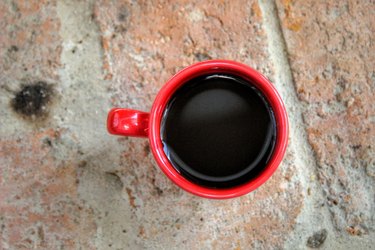
If you rely on your java to get your day started or as an afternoon boost, you might be wondering just how much caffeine is in a cup of coffee. The answer isn't that simple.
Tip
There's no simple answer to the amount of caffeine in a cup of coffee. Exact amounts depend on the types of beans, how it's brewed and the length of times it's roasted.
Video of the Day
The caffeine content in a cup of coffee depends on the type of bean used to brew it, as well as the type of coffee drink you choose to drink, from a regular brew, to espresso, and instant to decaf.
Video of the Day
Consider the Caffeine in Coffee
The exact amount of caffeine in a cup of coffee will vary depending on how strong you make it. According to an article published in 2017 by_ Journal of Psychology & Psychotherapy,_ there are about 100 milligrams of caffeine in a cup of coffee.
Instant coffee has a little less, clocking in around 80 milligrams. There's more caffeine in instant coffee vs. tea, which provides 30 milligrams. A can of soda typically has around 34 milligrams of caffeine.
If you prefer lighter roasts of coffee, you will get more caffeine in your eight-ounce cup than a darker roast. Even though darker roasts tend to have a deeper flavor, that is irrelevant to they're caffeine content, according to the National Coffee Association.
There is also a big difference when it comes to the beans used. Regardless of the lightness or darkness of the coffee, if you brew a cup of Arabica coffee beans, you may not get as much bang for your buck as a cup of Robusta coffee beans.
According to an August 2016 article published by European Food Research and Technology, Robusta coffee typically contains about twice the coffee caffeine amount than Arabica beans.
Read more: Long-Term Effects of Caffeine
Compare Coffee Types
There is also a caffeine difference between regular brews, espresso, instant coffee and decaf coffee.
If you make regular instant coffee, you'll get 28.3 milligrams per one teaspoons of dry grounds, according to the USDA.
On those days when you need that extra kick and add a shot of espresso to your coffee, you'll pack in another 63.6 milligrams of caffeine from just one ounce, per the USDA.
You'll even get a small amount of caffeine from decaf coffee — 2.4 milligrams per 8 ounce cup.
Know Your Limits
While everyone is different and you may be able to handle more caffeine than others, the Mayo Clinic reports that 400 milligrams per day is generally safe for most healthy adults.
It's perfectly fine to have some caffeine in your diet, but too much caffeine can affect your heart rhythm, make you dizzy, give you a headache or heartburn, and make you dehydrated.
Be aware of some of the side effects, and moderate your caffeine intake if any of them start to negatively impact you.
- National Coffee Association: "Coffee Roast Guide"
- European Food Research and Technology: "Chlorogenic Acids, Caffeine Content and Antioxidant Properties of Green Coffee Extracts: Influence of Green Coffee Bean Preparation"
- Journal of Psychology & Psychotherapy: "Neuropsychological Effects of Caffeine: Is Caffeine Addictive?"
- USDA FoodData Central: "Coffee, Instant, Not Reconstituted"
- USDA FoodData Central: "Coffee, Espresso"
- USDA FoodData Central: "Coffee, Brewed, Decaffeinated"
- Mayo Clinic: "Caffeine: How Much Is Too Much?"